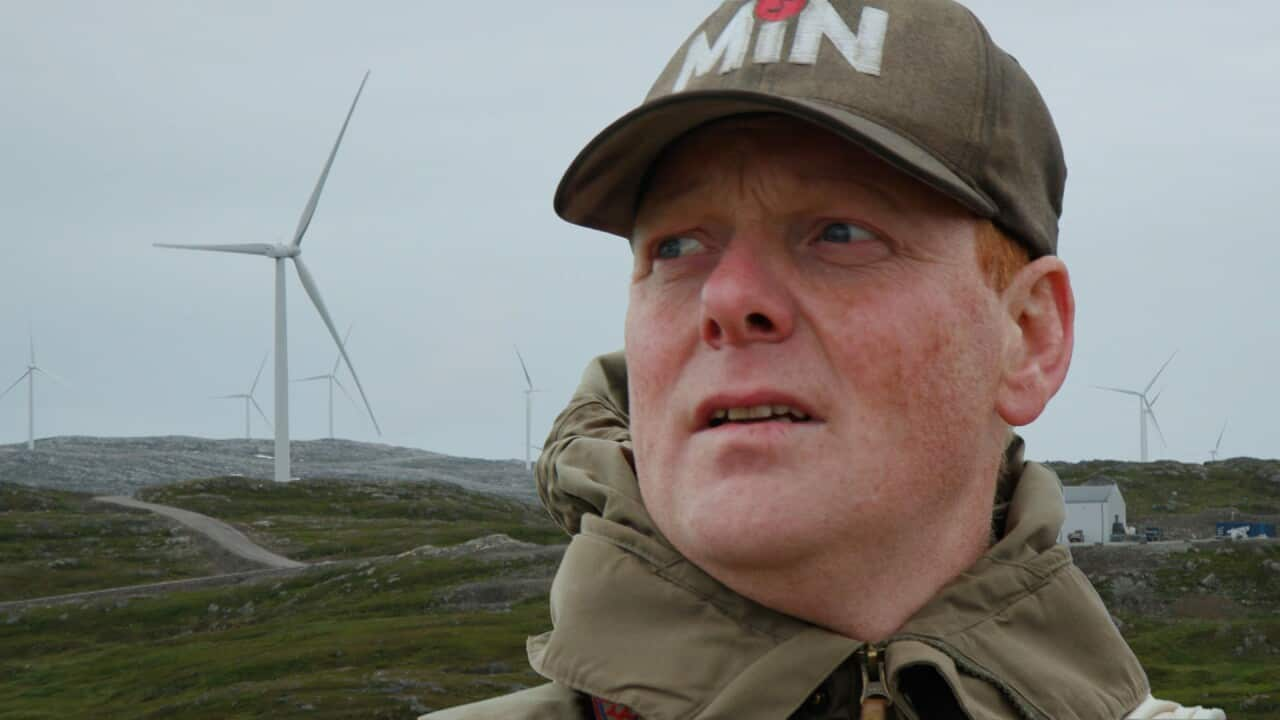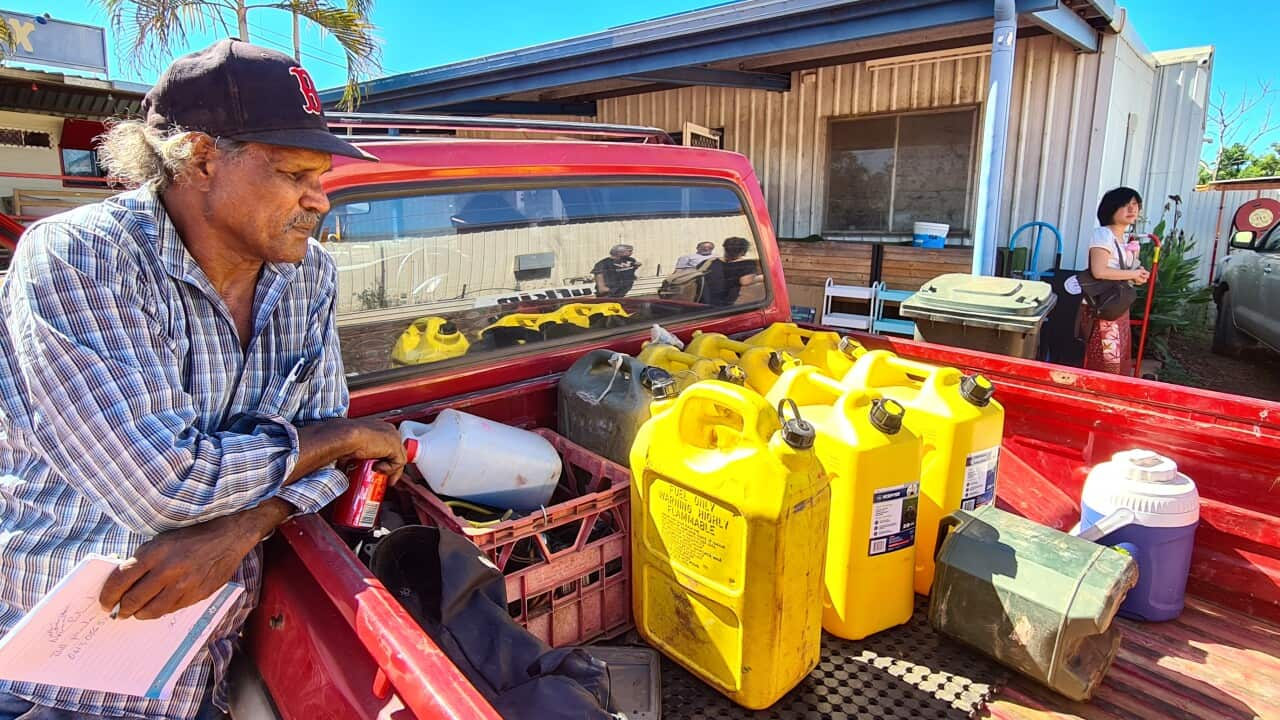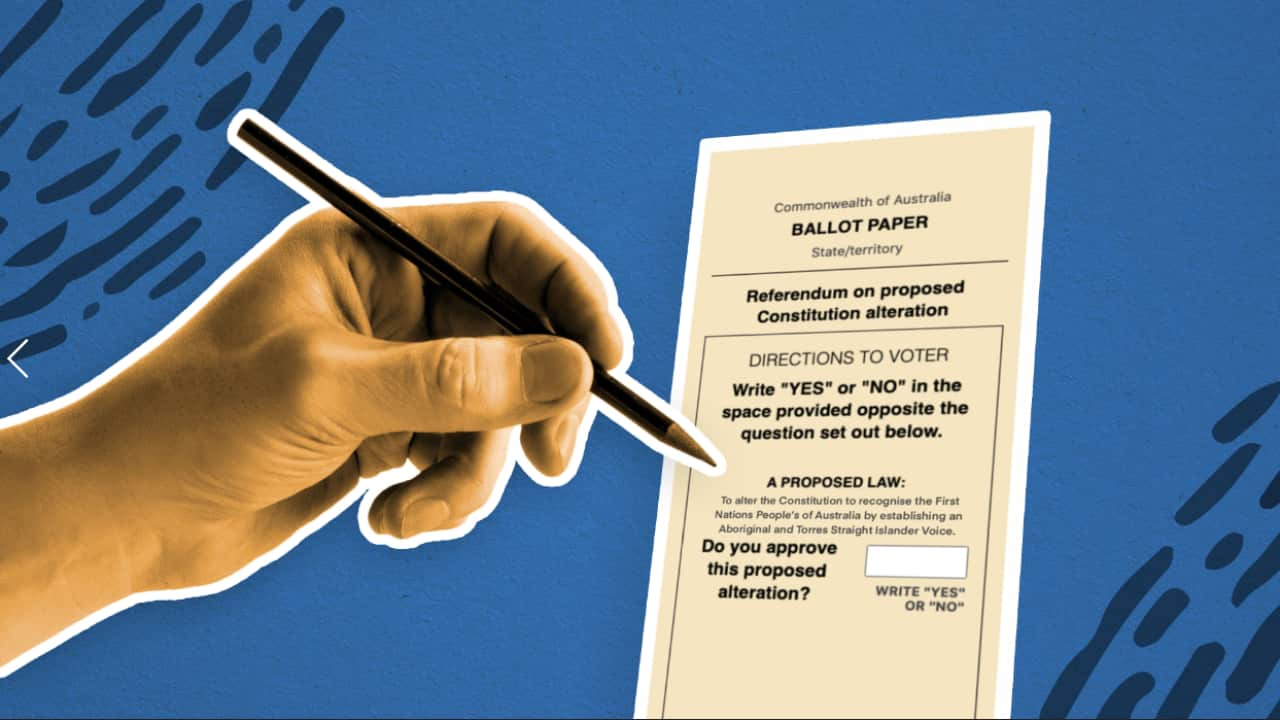With a speedy throw, Reiulf Aleksandersen lassoes a stray reindeer by its horns, ties it up, and carries it to his car.
The once wild reindeer are venturing away from the mountain pastures and closer to people, changing their usual behaviour. Aleksandersen says this is a result of the noise from wind turbines that were built on the lands where the animals graze. He captures the reindeer and takes them back to the mountains.
Aleksandersen is a Sámi reindeer herder. This traditional practice has sustained the Sámi people, an Indigenous group of northern Scandinavia, for generations. Reindeer were traditionally used for food, clothing, and transport, as the Sámi lived a semi-nomadic lifestyle moving between grazing pastures. These days herders still make a living by selling reindeer meat and skins.
"I can't imagine a life without reindeer herding or reindeer," Aleksandersen told SBS Dateline.

The Sámi are an Indigenous people inhabiting the Sápmi region, which spans across northern parts of Norway, Sweden and Finland and into Russia. There are thought to be around 80 – 100,000 Sami people across this region. Credit: SBS Dateline/ Caroline Huang
Norway aims to be carbon neutral by 2030, so the country almost entirely relies on renewable energy, with hydropower accounting for 92 per cent of electricity generation.
According to this year's Climate Change Performance Index, which tracks countries' climate protection performance, Norway has a 'high' ranking and is placed 10th in the world. Australia is ranked 55th - 'very low'.
But Norway is also a major oil and gas explorer whose expanding fossil fuel projects have faced a backlash from climate activists.
Having pledged to cut emissions in line with the Paris Agreement, the Norwegian government has been scaling up its wind power production both on and offshore. Many onshore farms have been built in the north on the lands used by the Sámi people to herd reindeer.
'These wind turbines are throwing ice about seven months a year'
Aleksandersen has been locked in a battle with Nordlys Vind, a major wind energy company that built a wind farm in 2018 in the area where his family has been herding their reindeer.
When Aleksandersen obtained the rights to herd reindeer in this area in 2015, he said the company had already obtained a licence for the construction of a wind farm. However, he didn't know the impact it would have on his reindeer at the time.
He says herding his reindeer on pastures near the wind farm has become too dangerous.

Aleksandersen captures the once wild reindeer, which he says are venturing away from the mountain pastures because of wind turbines, and takes them back. Credit: SBS Dateline
"These wind turbines are throwing ice about seven months a year," Aleksandersen said. "One kilo of ice in 200-kilometre speed, it's really a lot. People, animals, everything, it's dead."
He claims the cost of feeding his reindeer in wintertime comes out of his pocket, and he has to keep them away from the windmills.
He also says the noise from wind turbines disturbs the animals.
In a statement to SBS Dateline, Nordlys Vind said that it operates within the conditions of its permit. It denies that Aleksandersen is impacted by its operations, saying that the area near the wind farm isn’t a natural grazing area for reindeer in winter due to the lack of feed.
"We do not have any cases of ice throw impacting wildlife or the personnel of the wind farm, who drive past the wind turbines daily multiple times and park the winter vehicles below the turbines," the statement read.

Swedish climate activist Greta Thunberg (centre) and Indigenous Sami activists at a protest in Oslo in March 2023 against wind turbines built in the Fosen region of western Norway. Source: AFP / Javad Parsa/via Getty Images
Aleksandersen has reached a stalemate with the green energy company.
"Doing this to the reindeer land it's like doing something bad for all the reindeer people because when they don't respect me or my reindeer herding, what're they doing to respect others?," he said.
Reindeer herders take energy companies to court
Aleksandersen isn't the only Sámi reindeer herder railing against green energy producers.
In 2021, two reindeer herders filed a lawsuit against Fosen Vind, Europe's second-largest onshore wind farm, and won. The Norwegian Supreme Court found the wind farm violated Sámi cultural rights and the government’s decision to license them had been invalid.
The Norwegian ministers of agriculture and energy have apologised to the reindeer herders on the Fosen peninsula for the licences, acknowledging the negative impact the wind farm has had on their culture and rights. But two years on since the court ruling, the government is still looking for solutions to what to do with the wind farm.
The Sámi community continues to protest.
In March, their cause drew international attention when Swedish climate activist Greta Thunberg joined their rally outside the energy ministry in Oslo.
The Sámi parliament
Aleksandersen and other reindeer herders have been backed by the Sámi parliament of Norway.
Known as the Samediggi, it is a political body that deals with all matters of the Sámi people. There are between 80,000-100,000 Sámi people living in Norway.
Since its establishment in 1989, the Sámi parliament has made significant progress in revitalising and promoting the Sámi language and culture. However, it has been struggling to protect the land rights of the Indigenous population and sees wind farm projects as a human rights issue.

Silje Karine Muotka, the president of the Sámi Parliament of Norway, says their voice isn't heard in the halls of power when it comes to business and Indigenous land rights. Credit: SBS Dateline
"The reason why it's a human rights violation is that the herders cannot carry out their reindeer herding because of the wind power plant."
Aleksandersen hopes he'll be able to continue reindeer herding, although he's not sure what he’s going to do if nothing changes.
But there's something more that worries him: being unable to pass his ancestral culture on to his children.
"I'm afraid, if I don't have my reindeers, there's no reason for living for me," he said.
"I know that I'm not able to bring further the language, the culture, and I'm concerned about my children. So, for me, it's really frightening."












